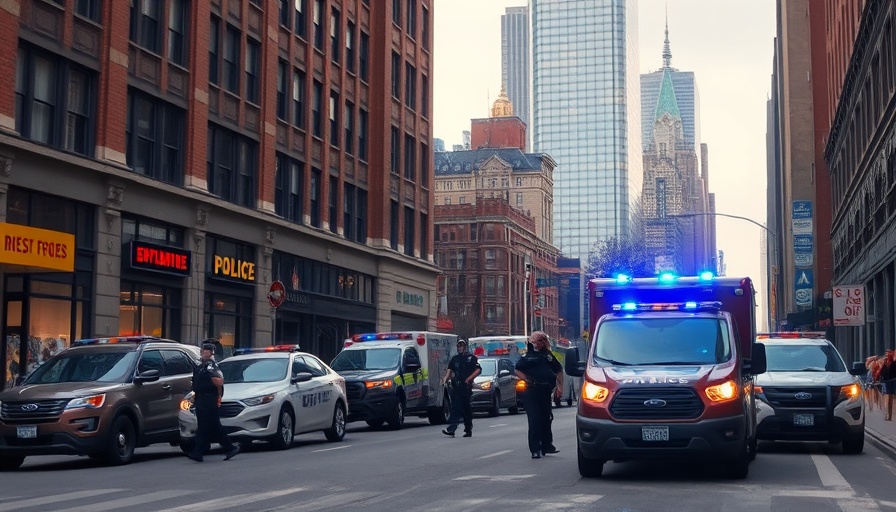
Understanding Lesotho: A Hidden Crisis from Tariffs
Lesotho, a small nation nestled within South Africa, has recently found itself thrust into the global spotlight, albeit not for the reasons its citizens would welcome. In a world where many may not recognize its name, this landlocked enclave is experiencing turmoil as it battles the repercussions of U.S. tariffs on textiles and shoes. As these tariffs become a tool of international trade policy, the implications for countries like Lesotho reveal how interconnected our global economy truly is.
Why Tariffs Matter: The Local Impact
The application of higher tariffs on imports from Lesotho has led to what officials are calling a state of disaster. This is not merely a political title; it translates into tangible hardships, including job losses among the workforce heavily reliant on exports to the U.S. The current economic landscape shows over 7,000 workers facing the threat of unemployment as companies cut back production or shut down entirely. For many communities, especially in areas where manufacturing makes up a significant portion of the economy, this could lead to severe social and economic challenges.
Echoing the Past: Lessons from Previous Economic Crises
Historically, we can draw parallels with previous tariff-induced crises around the globe. For instance, during the Great Depression, high tariffs contributed to a significant decline in international trade, deepening the economic challenges worldwide. In Lesotho, the vulnerability of its economy to external shocks speaks volumes about the interconnectedness of today's markets. As tariffs are imposed, one must consider how these actions can reverberate through economies that may seem far removed from the issue at hand.
Future Trends: A Closer Look at Global Trade Policies
Looking ahead, the situation in Lesotho raises critical questions about the future of global trade. Will the normalization of tariffs as tools for political strategy become commonplace, or will nations find pathways to collaborate effectively? Given the economic weight of larger nations on smaller partners, future changes could either empower or further disenfranchise countries like Lesotho. Analysts suggest that the dialogue around fair trade practices might intensify in response to these crises, emphasizing the need for sustainability over quick political gains.
Challenges in Adjusting to Economic Quakes
For Lesotho, the current chaos emphasizes the broader challenges faced by nations highly reliant on a single market. When protective trade measures are taken by a major economic player like the United States, smaller economies can suffer disproportionately. Efforts to diversify exports and improve local industries become vital, yet these measures take time, resources, and support from both the local government and international partners. As industries close their doors, lawmakers and economists in Lesotho must look creatively to foster resilience amidst growing uncertainty.
Decisions for Change: Driving Awareness and Action
For adults keen on following U.S. news events, this situation presents an opportunity for awareness and action. Understanding Tariffs isn’t merely academic—it has real-world significance that echoes through countless lives. Companies and consumers alike can advocate for policies that support fair trade and ethical practices, ensuring that small countries aren’t left to face the fallout alone. From participating in consumer awareness campaigns to pressing representatives for comprehensive trade reforms, every action counts toward fostering an equitable global marketplace.
Investigating the Emotional Ramifications
The anxiety surrounding unemployment looms heavy over Lesotho. For the citizens, their livelihoods and futures hang in the balance as major employers are pushed to the brink of closure. Emotional resilience is tested as communities rally together, but despair also sets in as families grapple with uncertainty. The personal stories of individuals affected by these tariffs make for powerful reminders of how policy decisions can reach far beyond initial projections, impacting lives in profound ways.
Conclusion: Understanding Our Role in Global Trade Dynamics
The crisis in Lesotho due to U.S. tariffs highlights not only the far-reaching impacts of economic policy but also our need to understand and engage with these issues. As we witness nations like Lesotho endure chaos, it stresses our responsibility as global citizens to advocate for fair trade practices. By following the developments in Lesotho or similar countries, we can foster a discourse that champions equity and sustainability in a global economy that often values profit over people. We invite you to stay informed and consider how you can play a role in supporting economic fairness and development.
 Add Row
Add Row  Add
Add 




Write A Comment